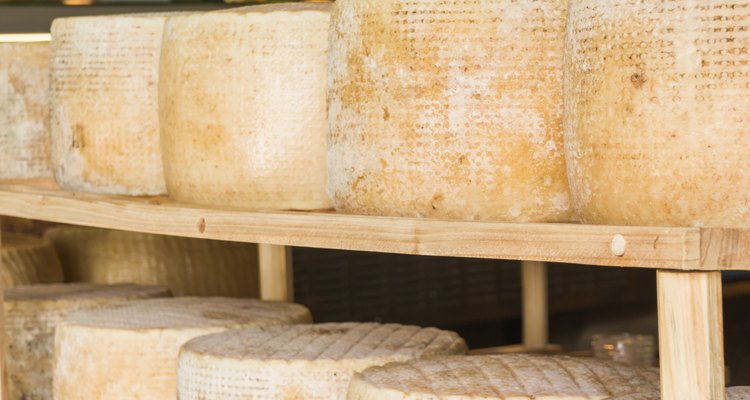
Giorez/iStock/Getty Images
Asiago cheese, a cheese made from cow's milk, is classified as fresh or mature. Fresh Asiago ages in just 20 to 40 days, while a mature Asiago matures for three months to one year. More mature varieties of Asiago cheese develop a sharp taste, but fresh Asiago cheese imparts a milder flavor. Aging, however, does not impact this cheese's nutritional value.
Calories
One oz. of Asiago cheese contains 100 calories, or 5 percent of the calories you may consume if you follow a 2,000-calorie diet. Asiago is commonly eaten alone, as well as used in recipes. If you eat Asiago cheese as a snack, stick to just 1 or 2 oz. -- The Diet Channel notes that snacks should range from 100 to 200 calories. You can combine this cheese with turkey deli meat and apple slices for an after-workout snack as well, according to "Fitness" magazine.
Fat and Cholesterol
Asiago cheese contains a high amount of fat -- 8 g, accounting for 72 percent of the calories in a 1-oz. serving. The saturated fat content is reason for pause: 5 g of that fat is saturated. Your meal plan should contain no more than 15 g of saturated fat each day. This type of fat may raise your blood cholesterol levels and put you at higher risk of stroke and heart attack. One oz. of Asiago cheese contains 25 mg of dietary cholesterol -- limit your consumption of cholesterol in food sources to 300 mg per day.
Sodium
A 1-oz. serving of Asiago cheese contains 340 mg of sodium. The U.S. Centers for Disease Control warns that consuming too much salt -- the Institute of Medicine recommends no more than 1,500 mg per day -- can put you at greater risk of stroke, heart attack and elevated blood pressure. The average American ingests far more salt than is safe -- 3,436 mg per day -- and the level of salt in diets continues to increase.
Carbohydrates and Protein
Do not rely on Asiago cheese to give you a big boost in energy -- each 1-oz. serving contains less than 1 g of carbohydrates, your body's main energy source. A portion of this cheese does provide 7 g of protein, however. Protein serves as a secondary source of energy and allows your body to replenish proteins in your organs and muscles as needed. This macronutrient also plays a vital role in maintaining the strength of your immune system, helping you ward off infections.
Vitamins and Minerals
Asiago cheese serves as a rich source of calcium, a mineral your body utilizes for bone strength. A 1-oz. serving of Asiago cheese provides 20 percent of the daily recommended intake of calcium. This essential mineral may find use as a treatment for premenstrual syndrome symptoms, high blood pressure and underactive parathyroid glands, a condition known as hypoparathyroidism. Consuming adequate levels of calcium may also prevent strokes and colon cancer. Including 1 oz. of Asiago cheese in your meal plan also has 5 percent of the vitamin C your body requires on a daily basis. Vitamin C also strengthens your bones, making Asiago cheese an excellent option to help prevent osteoporosis, a condition that results in weakened and easily fractured bones that occurs as you age.
Related Articles
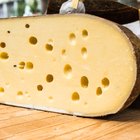
Swiss vs. Cheddar Cheese Nutrition ...

Vitamins for Mental Alertness

Nutrition Information on Blueberries
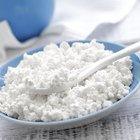
Benefits of Cottage Cheese

What Are the Health Benefits of White ...

How to Get Fit in 4 Weeks
Fried Clams Nutrition

How to Make Electrolyte Water With Salt ...

Provolone Cheese Nutrition Information
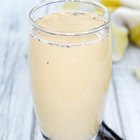
Nutrition Information For a 16-Ounce ...

Zinc Treatment for Rosacea

Do Body Wraps Help Cellulite?

Can I Exercise on the Master Cleanse ...

How to Gargle With Sea Salt

High Fiber & Protein Diet Menus

The Best Fluids to Drink With COPD
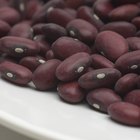
Red Kidney Beans Nutrition

How to keep your face smooth and ...

How to Reduce Acne Inflammation
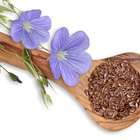
Flaxseed Meal Nutrition
References
Writer Bio
Nicki Wolf has been writing health and human interest articles since 1986. Her work has been published at various cooking and nutrition websites. Wolf has an extensive background in medical/nutrition writing and online content development in the nonprofit arena. She graduated with a Bachelor of Arts in English from Temple University.
Photo Credits
Giorez/iStock/Getty Images